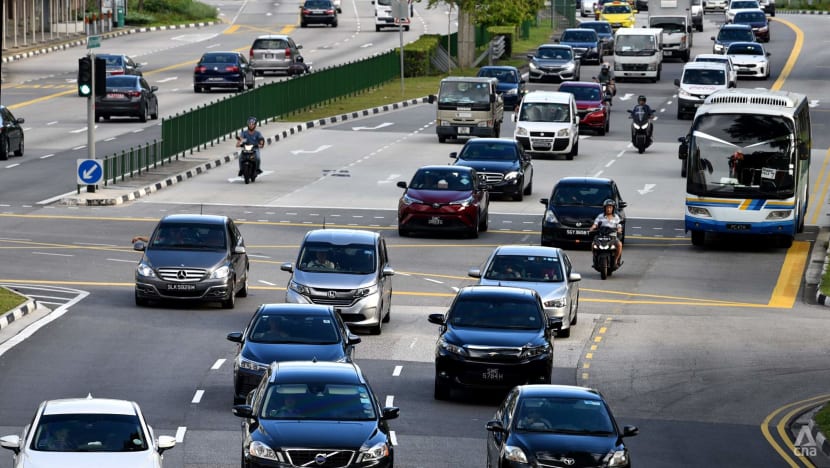COE quota increase unlikely to push down prices, demand still exceeds supply: Analysts
Around 6,000 deregistrations will be brought forward and distributed across the next few quarters, but that may not be enough to meet demand.

Cars and other vehicles in Singapore. (File photo: CNA/Jeremy Long)
SINGAPORE: Prices of Certificates of Entitlement (COEs) may stabilise but are unlikely to fall much despite a one-time adjustment by the Land Transport Authority (LTA) to increase supply, according to analysts.
The move, announced on Monday (May 8), is meant to reduce volatility in the supply of COEs after premiums rose to record highs this year.
For May to July, the COE quota will increase from 9,575 to 10,431. The quota for Category A in May’s second bidding exercise will be 24 per cent higher than the first tender, and 15 per cent higher for Category B.
But observers said the effect of the adjustment may be muted because demand remains high - and could even tick up with a slight dip in prices.
“Because the supply injection is relatively gradual ... the most that can be expected is to stabilise COE prices,” said transport economist Walter Theseira, an associate professor at the Singapore University of Social Sciences.
He does not expect a huge reduction similar to what was seen in motorcycle COE prices last week.
“We have to remember that in the end, the overall COE supply this year and next is still going to be less than half of COE supply in high-supply years in the later part of the decade.
“So you can't expect to have low COE prices with that kind of limited supply,” Assoc Prof Theseira added.
Associate Professor Raymond Ong of the National University of Singapore pointed to bids versus quotas.
“You’ll notice there is steady, pent-up demand consistent over the past few months,” he said.
People watching the situation may also decide it is now time to enter the market.
“It may easily negate that effect of the 24 per cent (quota increase),” said Assoc Prof Ong, who is from the Department of Civil and Environmental Engineering at the National University of Singapore.
Transport Minister S Iswaran said in parliament that COE premiums are expected to rise as household incomes climb but Singapore's car population growth remains at zero.
HOW THE ADJUSTMENT WORKS
LTA announced on Monday it would bring forward around 6,000 guaranteed deregistrations of five-year COEs. These certificates are set to expire when supply is higher, and will be distributed over the next few quarters.
Deregistrations are guaranteed for five-year COEs because car owners are not allowed to renew the certificate when it expires.
“This is in contrast to ten-year COEs, where vehicle owners have the option to renew their vehicles upon COE expiry, which thus cannot guarantee that these expired COEs will make their way back into the pool,” said Mr Yeo Swee Guan, management associate at Motorist Singapore.
The five-year COEs will be released progressively in the near future to help bolster supply instead of when they are deregistered.
LTA said the growth rate for the car population remains at zero.
“LTA has identified the specific vehicles in the vehicle registry with these five-year non-extendable COEs. When the identified vehicles are deregistered in future, their quota will not be returned to the pool for bidding,” the agency said in a media release.
Assoc Prof Ong said the authorities were “borrowing from the future”, but that the number was not overwhelming when compared to the total number of vehicles in Singapore and should not have an impact on traffic congestion.
10-YEAR COE CYCLE
Vehicle owners typically deregister their cars when the COE expires after 10 years, which means that supply of COE can be predicted based on how many cars were registered a decade ago, said Assoc Prof Theseira.
If the COE supply was high 10 years ago, deregistrations and hence supply are likely to be high now.
The LTA’s adjustment takes certificates from years when supply was expected to be high due to the 10-year cycle, and brings them to today when their incremental supply makes a bigger difference, he said.
But the policy will not solve the long-term 10-year cycle problem, said the associate professor.
“In fact, the market tendency is that over time, the COE cycle gets more lopsided, not less lopsided.
“This is because there is a great incentive for owners of cars bought during very expensive, low-supply COE periods, to deregister their cars early during a high-supply COE period, so they can get into a newer car with similar or even lower monthly depreciation,” he added.
There needs to be a more direct policy of redistributing COEs to address the problem, said Assoc Prof Theseira.
Mr Yeo of Motorist Singapore noted that 6,000 COEs represent only around 1 per cent of the total supply of certificates.
“Supply will still generally continue to track the levels of COEs available from 10 years ago, and consumers will continue to face a crunch in supply in years with low COE numbers available,” he said.
He said this was probably “unavoidable” unless LTA readjusts the total number of COEs available across a full 10 years to even out supply. But such a policy would be impractical to implement, Mr Yeo added.
“Although this one-time measure is well-intentioned on the part of LTA in helping to alleviate price volatility in the COE market, demand may continue to outstrip supply as long as sufficient consumers find it attractive to continue to purchase cars at current prices,” he said.

















